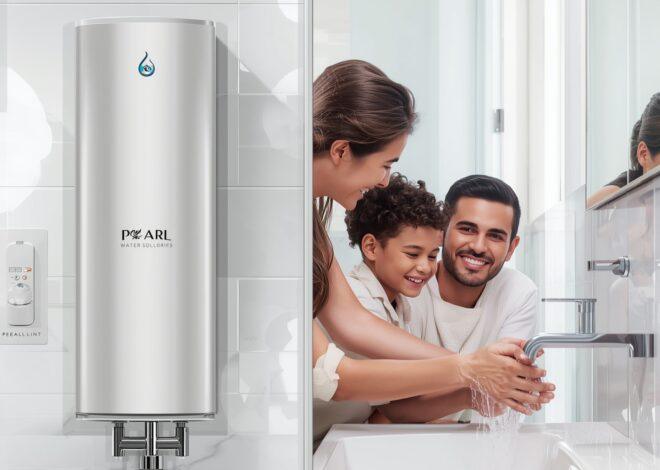Water Softener - Complete Guide to Solve Hard Water Problems | Pearl Water Technologies
Best Water Softener for Home & Bathroom | Pearl Water Technologies
Say goodbye to hard water problems! Explore the best water softener for home & bathroom from Pearl Water Technologies. Long-lasting & cost-effective solution.
Table of Contents
Introduction to Hard Water Problem
What is a Water Softener?
Why Do You Need a Water Softener?
Key Benefits of Installing a Water Softener
Types of Water Softeners
How Does a Water Softener Work?
Applications of Water Softeners (Domestic & Industrial)
Factors to Consider Before Buying
Maintenance of a Water Softener
Cost of Water Softeners in India
Why Choose Pearl Water Technologies?
Conclusion
FAQs
Introduction to Hard Water Problem
In India, hard water is one of the most common issues faced by households. Hard water contains a high concentration of calcium and magnesium ions. These minerals cause several problems like:
White stains on bathroom fittings, taps, and tiles
Reduced efficiency and lifespan of geysers, washing machines, and RO purifiers
Dry skin, itchy scalp, and rough hair
Higher consumption of detergents and soaps
Blockage of plumbing lines due to scale deposits
A water softener is the most effective solution to eliminate these issues by converting hard water into soft water.
What is a Water Softener?
A water softener is a filtration system designed to remove hardness-causing minerals. It works on the principle of ion exchange, where calcium and magnesium ions are exchanged with sodium ions, resulting in soft water.
Soft water is gentle on the skin, keeps appliances safe, reduces maintenance costs, and enhances the overall quality of life.
Why Do You Need a Water Softener?
You need a water softener if you face:
Scaling on taps and tiles - White stains are common signs of hard water.
Reduced appliance efficiency - Geysers and washing machines consume more energy.
Dry skin and rough hair - Hard water strips natural oils.
Extra use of soap and shampoo - Hard water reduces lathering capacity.
High maintenance bills - Plumbing systems often choke due to scale buildup.
Key Benefits of Installing a Water Softener
Soft & smooth skin and silky hair
No more white stains on bathroom fittings
Long lifespan of geysers, washing machines & RO systems
Reduced soap and detergent usage
Energy-efficient water heatin
Cost savings in plumbing maintenance
5. Types of Water Softeners
Domestic Water Softener - For bathrooms, kitchens, and individual households.
Commercial Water Softener - Suitable for hotels, gyms, salons, and offices.
Industrial Water Softener - Large-scale units used in factories, hospitals, and institutions.
How Does a Water Softener Work?
The working mechanism is simple yet effective:
Hard water passes through a resin bed inside the softener.
Calcium and magnesium ions (hardness-causing minerals) stick to the resin.
Sodium ions are released into the water, making it soft.
After a certain period, the resin bed is regenerated with salt water to recharge its capacity.
5. This cycle ensures a continuous supply of soft water.
Applications of Water Softeners
Homes - Protects bathrooms, kitchens, and appliances.
Housing Societies - Common softeners for multiple flats.
Hotels & Restaurants - Provides quality water for cooking and cleaning.
Hospitals - Ensures safe water for equipment and patient care.
Industries - Boiler feed water, textile, pharmaceutical, and manufacturing units.
Factors to Consider Before Buying
Water hardness level - Test your water before buying.
Capacity & flow rate - Choose based on family/usage size.
Manual or automatic regeneration - Automatic is more convenient.
Space availability - Select compact or large units as per need.
After-sales service - Always buy from a reliable provider.
Maintenance of a Water Softener
Regular salt refilling (20–25 days depending on use)
Occasional cleaning of resin bed
Annual service for optimal performance
Use only recommended softener salt
Cost of Water Softeners in India
The price of a water softener depends on:
Capacity (domestic, commercial, or industrial)
Manual vs. automatic operation
Brand and resin quality
Domestic water softeners start around ₹8,000–₹20,000.
Commercial & Industrial water softeners can range from ₹25,000 to ₹1,00,000+ depending on size.
Why Choose Pearl Water Technologies?
Pearl Water Technologies is a trusted brand in water treatment solutions. We provide:
High-quality domestic & industrial water softeners
Affordable pricing with durable design
Expert installation & after-sales support
Customized solutions for homes, hotels, and industries
100% customer satisfaction guarantee
👉 Explore our products here: https://pearlwater.in/water-softeners
Conclusion
Hard water affects your health, appliances, and home fittings. Installing a water softener is the ultimate solution to protect your family, save money, and ensure long-lasting appliances.
Choose Pearl Water Technologies for the best water softener solutions in India.
FAQs
Q1. What does a water softener do?
It removes calcium and magnesium ions, making water soft.
Q2. Can I drink softened water?
It’s safe but usually recommended for bathing & cleaning, not direct drinking.
Q3. How often should I add salt?
Every 20–25 days based on usage.
Q4. Does soft water feel different?
Yes, it feels smoother and lathers more easily.
Q5. Can it reduce electricity bills?
Yes, as appliances like geysers work more efficiently.
Q6. Is installation easy?
Yes, Pearl Water offers professional installation.
Q7. Do I need a softener for one bathroom only?
Yes, Pearl Water has compact bathroom softeners.
Q8. What is the life of a softener?
10–15 years with proper maintenance.
Q9. Can I shift my softener to another home?
Yes, it is movable with reinstallation.
Q10. Why should I choose Pearl Water Technologies?
For durable quality, advanced technology, and reliable support.
